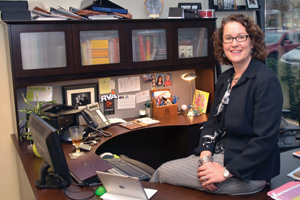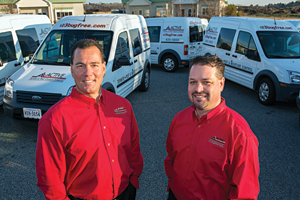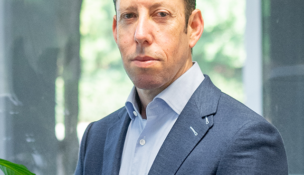You’ve got to be green
Sustainable practices make a difference in recruiting top talent and lowering energy costs.
Virginia Business //March 31, 2013//
You’ve got to be green
Sustainable practices make a difference in recruiting top talent and lowering energy costs.
Virginia Business //March 31, 2013//
Michael Rao, the president of Virginia Commonwealth University in Richmond, has a pretty good idea what being green means to his nearly 32,000 students.
Nationally, two-thirds of prospective students search out information about a college’s commitment to sustainability, and a quarter of them consider an institution’s sustainability efforts an important factor in deciding where they go to school.
But the importance of growing up green really hit home when Rao’s 4½-year-old son, Aiden, recently led him through an inventory of the kitchen trash can. The boy was looking for items that had not gone into the recycling bin, and he wanted to know whether they might be repurposed in some other way. “We didn’t consider the bacteria,” Rao said with a laugh as he told the story at VCU’s annual Energy & Sustainability Conference in late January.
For a generation that has come of age with recycling in the home and lessons in environmental stewardship at school, going green has become an anthem. “It’s not just a movement, it’s a way of life,” says David Lubin, chairman of the Connecticut-based Esty Sustainability Innovators Working Group.
The group is a research consortium of leading firms — among them IBM, Boeing, Dow Chemical, Disney, Coca-Cola, Wal-Mart, FedEx, Xerox and Johnson & Johnson — that are collaborating on new models for executing corporate sustainability strategy.
Lubin was the keynote speaker at the VCU conference where he urged the more than 700 business, academic and corporate leaders to view sustainability as a “megatrend.”
The changes that shape a sustainable economy will be broad, deep and persistent, he said, and urbanization, new technology and innovation are all driving the process.
Sustainability can be defined in many ways, but one widely accepted definition is that it is a method of harvesting and using a resource without depleting it for future generations.
The corporate world often defines successful sustainability efforts with the mantra, “businesses doing well by doing good.” A growing number of Virginia businesses, from A-Active Termite and Pest Control in Virginia Beach to Philip Morris USA in Richmond, are finding that sustainable practices are helping them recruit skilled workers and improve their bottom line.
An edge in the talent search
Genevieve Roberts, a partner with the Titan Group, a human resources consulting firm in Richmond, says that companies with green practices have a leg up when searching for the best talent.

Roberts adds that young workers are much more comfortable than their parents in asking a prospective employer about its sustainability plan, whether employees work in a green building and if the company uses environmentally safe chemicals.
That doesn’t mean a company’s environmental record is the top priority of applicants in this troubled economy. First of all, they want jobs, says John Martin of the Richmond-based Southeastern Institute of Research.
Citing results from a recent survey conducted by his firm, Martin notes that 62 percent of respondents listed “offers good health benefits” as a major employer attribute while only 28 percent cited “perceived as environmentally responsible.”
Martin suggests, however, while a green reputation may not be top-of-mind for many job seekers, they still care about how a company treats the environment.
He notes that one in three people surveyed said they would be more inclined to work for a green company, and six in 10 said their current employer should be doing more to be environmentally responsible.
In some ways the recession has aided the green movement. Martin says hard times have pushed some elements of society into a position of “responsible consumption,” and frugality also has become a trend.
As a result, a World War II-era rhyme that became popular when consumer goods were in short supply is now sometimes heard as part of the green movement: “Use it up, wear it out, make it do or do without.”
Martin also notes the increasing presence of women in the work force — they now outnumber men — bodes well for the green movement. Female influence likely will lead to more socially responsible decisions, he says.
Business school cited
Students at the Mason School of Business at the College of William & Mary receive a lot of exposure to the virtues of going green. In 2011, Bloomberg Businessweek ranked the school first nationally in sustainability, in a nod to courses such as “Green Supply Chain” and “Environmental Consulting.” Recently, the school also was named one of the nation’s “10 Environmentally Aware Business Schools” by MBAPrograms.org.
Christopher Adkins, executive director of undergraduate programs at the Mason School, says these accolades reflect the attitudes of future business leaders.
“Students want to make a difference by what they do every day in their careers,” he wrote in a CNN blog post. “They want to work for organizations that weave sustainability into their core strategy.”
Among other evidence, Adkins cited an IBM global student study “Inheriting a complex world: future leaders envision sharing the planet.”
One finding was that students are much more interested in sustainability and globalization than CEOs, and they view the two issues as inherently linked.
The study quoted the response of a U.S. student as an example of an emerging ethos. The student said an emphasis on sustainability leads to an awareness of the effects of globalization and everyone’s responsibility to others in the world.
An example of William & Mary’s commitment to going green is its “Do One Thing” (DOT) initiative that asks the college community to do one thing for sustainability.
For example, W&M President Taylor Reveley has pledged to use non-disposable coffee cups whenever possible.
Net Impact, a San Francisco-based nonprofit group whose aim is to help business-school graduates make social and environmental impacts, recently released the results of a survey indicating that by a ratio of 2 to 1 workers who were able to make such impacts were the most satisfied.
The survey of 1,726 respondents — heavily tilted (47 percent) toward those in the 21-32 age group — was conducted by Rutgers University.
Good for more than PR
In addition to attracting skilled workers and keeping them engaged, companies are finding that being green also helps the bottom line.
A 2011 survey by McKinsey & Co., a global management consulting firm, found that many companies are actively engaged in integrating sustainability principles into their businesses. Initially, most companies used these practices as a way to manage their reputations, to show that they were doing their part to help the planet.
But the McKinsey survey found that many companies have moved beyond reputation management. Today, saving energy, developing green products and retaining and motivating employees are equally important, if not more important.
In fact, the most frequent reason to initiate sustainability efforts — chosen by 33 percent of 2,956 respondents — was not to manage a corporate reputation but to improve operational efficiency and lower costs.
The McKinsey survey noted, for example, that Wal-Mart is expecting to generate $12 billion in savings by reducing packaging across it global supply chain. The company’s goal, by this year, was to reduce packaging by 5 percent, compared with 2006 totals.
Smaller packages mean more packages per carrier of cargo, which in turn means fewer carriers, a smaller carbon footprint and less diesel fuel. That all adds up to savings, which resonates with Wal-Mart’s ubiquitous slogan “Save money. Live better.”
The McKinsey survey also cited Dow Chemical. It has invested less than $2 billion since 1994 to improve its management and use of resources but experienced a savings of $9.8 billion for reduced energy consumption and water waste in its manufacturing processes.
Virginia success stories
At VCU’s Sustainability Conference, companies with operations in Virginia told of their successes.
Sean Delehanty, sustainability manager for BAE Systems Electronic Systems Group, reported that his unit had cut its operating expenses by $6.7 million during the past four years, including an 11 percent drop in energy costs and a 14 percent reduction in its carbon footprint.
If you want to get the C-Suite’s attention for money to fund sustainability efforts, Delehanty said, a manager needs to show how those efforts will create savings or improve the bottom line.
Jeff Rinker, environmental engineer at the MillerCoors Shenandoah Brewery in Elkton, said the brewery reduced its water consumption by 23 percent, or a million gallons, compared with 2008 levels. Among the strategies used to achieve that: Everyone looks for leaks, which brings employees together in a common cause.
Blasé Keegel, utility and environmental engineer at Philip Morris USA, said the company’s Park 500 tobacco processing facility in Chester had cut landfill waste by more than 95 percent, and also had significant reductions in electricity use and water.
To reduce the level of nutrients in wastewater discharge from the facility, Philip Morris developed a wetlands system that not only reduces nutrients but provides 60 acres of wildlife habitat along the James River. The system has won environmental awards and helped the company’s relations with conservation groups and its neighbors.
Elizabeth Povar, vice president of business expansion for the Virginia Economic Development Partnership, says that for many “sustainability is almost a synonym for energy.”
And she says sustainable energy development can drive economic development. She offered several examples in Virginia, including the $75 million Enviva wood pellet manufacturing plant in Southampton County, which has a work force of about 70.
The plant, which uses local raw materials harvested through sustainable forests, will be exporting most of its wood pellets to European utility customers.
Povar also pointed to the $285 million biomass boiler that MeadWestvaco invested in its bleached paperboard mill in Covington, which employs about 1,000 workers.
The new boiler — burning mostly renewable biomass such as wood bark and wood residues left behind from logging operations —will enable the mill to be self-sufficient in energy and eliminate its need to burn coal.
The ‘green’ exterminator

One of the state’s most enthusiastic cheerleaders for sustainability comes from an industry — pest control —not often associated with the green movement.
Kevin Kordek, president of A-Active Termite and Pest Control in Virginia Beach, says sustainability efforts and sensitivity about the environment have become hallmarks of his company, which has 39 employees and had revenue of $3.79 million in 2011.
A biology major in college, Kordek says he’s always tried to avoid using harsh chemicals in pest control, opting instead for treatments that are far less damaging to the environment, such as controlling termites with baits instead of sprays.
Those efforts have earned the company a “Green Pro” designation from the National Pest Management Association, a group that Kordek led in 2010-11 as its national president. “The attitude I have is not universal within the industry,” Kordek acknowledges, “but if you can turn it into a positive, it’s great for your customers. ”
Besides his belief that pest control can be environmentally responsible, Kordek also has pursued changes in his businesses that produce savings and also are environmentally friendly.
For one, he has replaced service vehicles with more fuel-efficient ones, and the company uses a routing program to reduce the number of miles driven every day. That move not only saves fuel but also helps put more money in the pockets of technicians because they can make more house calls.
Office recycling of paper, glass, aluminum and plastic and a paper-reduction program — “We’re 99 percent paperless now” — also are steps he has taken to become greener. One aspect of the paper-reduction initiative is to have technicians carry handheld devices that eliminate printed service tickets and invoices. Customers conduct most of their transactions online.
Last year, A-Active Termite was named “Small Business of the Year-Virginia Beach” by the Hampton Roads Chamber of Commerce. In February, Virginia Business named it one of the Best Places to Work in Virginia.
Kordek says stewardship of the environment is part of the culture of his company, and he looks for people who share that philosophy. He said he’s had no trouble finding them, because his employees do the recruiting. “We haven’t hired anyone off an ad in three years,” he says.
One of Kordek’s neighbors in Hampton Roads, Old Point National Bank, also has integrated sustainability practices into its culture. “We’re community oriented. We want to help the world become a better place,” says Erin Black, Old Point’s director of marketing.
The bank’s sustainability efforts range from aggressive recycling to turning off lights whenever possible. When its old headquarters was torn down, the bank reduced the environmental impact by sending debris to a recycling center and reusing the vault door.
Black says the bank’s new headquarters will be LEED certified. In that respect, Old Point will be in good company.
In 2012, Virginia ranked as the top state for new eco-friendly buildings, according to the D.C.-based U.S. Green Building Council.
No one can say for certain what overall implications the green movement will have for business. Nonetheless, Lubin told the VCU conference that companies need to build sustainability into their business strategy, because that’s where the marketplace is heading.
He acknowledged that some business leaders are trying to ignore the movement completely. They have been successful doing things the same way for many years and see no reason to change. “They are prisoners of their own success,” Lubin said.
l


















